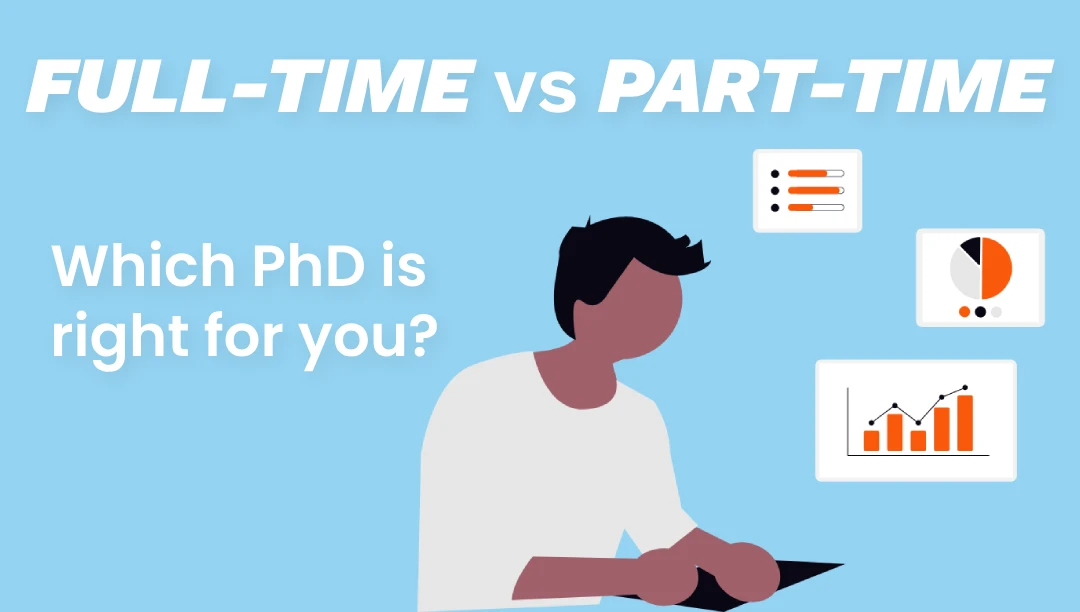Blog • Posted on Jul 25, 2025
How to Choose Between a Part-Time and Full-Time PhD Program
Not all PhDs are created equal, especially when it comes to time.
Whether you're juggling a job, raising a family, or aiming to finish your doctorate in record time, the choice between a full-time and part-time PhD is more than a scheduling decision. It can shape your funding options, career path, research progress, and overall wellbeing.
In this post, we break it down so you can make the right decision based on your goals, not someone else's expectations.
Key Takeaways
- Full-time PhDs are faster and often better funded but require full commitment.
- Part-time PhDs offer flexibility and income stability but take longer and can feel isolating.
- There is no perfect model, only what fits your personal, financial, and academic needs.
- Many universities now offer flexible paths, including switching modes mid-program.
Table of Contents
- Key Takeaways
- What’s the Difference Between a Full-Time and Part-Time PhD?
- Pros and Cons of a Full-Time PhD
- Pros and Cons of a Part-Time PhD
- Common Myths About Full-Time and Part-Time PhDs
- Questions to Ask Before You Decide
- What Do Universities Allow?
- Can You Switch Between Full-Time and Part-Time During a PhD?
- Does It Matter in the Long Run?
- FAQs
- Conclusion
What’s the Difference Between a Full-Time and Part-Time PhD?
Here are the key differences at a glance:
| Aspect | Full-Time PhD | Part-Time PhD |
|---|---|---|
| Typical Duration | 3–4 years | 6–8 years |
| Time Commitment | 40+ hours/week | 15–25 hours/week |
| Common Funding | Scholarships, stipends, research assistantships | Self-funded, employer support, or limited grants |
| Ideal For | Those with full-time availability and career focus in academia | Working professionals or caregivers balancing other commitments |
| Institutional Access | Full-time access to labs, supervisors, and campus resources | May have limited access depending on policies |
| Visa Eligibility (for international students) | Often required for visa sponsorship | May not meet visa criteria in some countries |
Some programs allow you to toggle between modes depending on your circumstances. But many don’t. Be sure to check your university's policy early.

We Help Working PhDs Finish Faster & Publish More Through:
- 1-On-1 Mentoring - Real people. Real results.
- Professional Editing - Our team of expert editors will get your manuscript publication-ready.
- Online Courses - Learn invaluable presenting & writing skills.
Pros and Cons of a Full-Time PhD
Choosing whether to enroll full or part time really comes down to two things: time and discipline. Here's the breakdown:
Pros:
- Faster completion: Most full-timers graduate in 3-4 years.
- Immersion: You're in the thick of research culture every day.
- Funding access: More scholarships and stipends are geared toward full-time students.
- Academic visibility: Easier to attend conferences, seminars, and build networks.
Cons:
- Less income flexibility: Harder to work on the side.
- High pressure: Burnout is real without strong support.
- Life on hold: May delay family or financial goals.
Need help staying focused during full-time study? Our PhD mentoring program can help you stay on track and avoid common pitfalls.
Pros and Cons of a Part-Time PhD
Pros:
- More flexibility: Ideal for working professionals or caregivers.
- Steady income: You can work while studying.
- Time to reflect: More space for deeper thinking and writing.
Cons:
- Slower progress: Can take up to 8 years.
- Funding challenges: Fewer scholarships/stipends available.
- Isolation: Harder to stay connected to academic life.
FindAPhD.com explains this well.
Asking yourself whether a part-time PhD is worth it? We broke down the pros, cons, and even alternatives to the part-time PhD here.
Common Myths About Full-Time and Part-Time PhDs
Myth 1: Full-time is the only “serious” option.
Full-time study is more traditional, but part-time candidates often bring valuable experience and long-term focus. Many institutions now support both routes equally.
Myth 2: You won’t be competitive for academic jobs if you go part-time.
Hiring committees care about the quality and quantity of your outputs, not how many hours you worked per week. What matters is how you’ve used your time.
Myth 3: It’s easy to switch between part-time and full-time.
Switching is possible in many programs, but not always simple. Funding conditions, visa regulations, and supervision agreements can limit flexibility. Always check with your institution first.
Myth 4: Part-time students are less committed.
Many part-time PhD students balance research with careers, families, or caregiving. Their time management and dedication often rival or exceed that of full-time students.
By the way, if you struggle with paper writing, you can get daily tips straight from me to your inbox here (it's completely free).
Questions to Ask Before You Decide
Before you make the leap and commit to either pathway, take the time to assess the reality of your choice fully.
Ask yourself:
- Do I need a stable income during my PhD?
- Can I dedicate 35+ hours a week to research?
- Do I have caregiving responsibilities?
- Am I eligible for visas or scholarships?
- How quickly do I want to finish?
Already doing a part-time PhD? Read our practical guide to doing a PhD while working a job
What Do Universities Allow?
Difficult to answer. PhD structures vary globally.
In the UK, unis are quite flexible with part-time options, especially for mature students. By contrast, almost all PhD programs in the US are full time due to funding structures and teaching loads.
Here in New Zealand (and also in Australia), part-time study is almost always allowed but visa limitations apply if you're here as an international student.
Take a trip to Germany and things are different yet again. Many PhDs there do their PhDs while employed (external model), not to mention you're considered an employee while working as a PhD candidate!
The long story short: it depends. Do you your research and see what's available to you. Just be sure that your visa and funding conditions allow it.
Can You Switch Between Full-Time and Part-Time During a PhD?
Sometimes. Universities often let you:
- Start full-time and switch to part-time after a life event
- Take approved leave for parental responsibilities
- Gradually reduce (or increase) your workload
Bare in mind though that some funding agreements prohibit mode changes, or are tied to strict timeframes that don’t accommodate extended study. Likewise, your supervisor’s grant funding window may not allow for a stretched timeline, especially if your research is project-based.
Safest option? Check with your supervisor first.
They will be the first to let you know whether changing modes is possible or not. And even if changing modes isn't advisable, they'll often help come up creative solutions to help you navigate any obstacles your facing.
Does It Matter in the Long Run?
Not really.
Most employers won’t care how long it took.
You won’t list "part-time" on your CV. But you will list publications, collaborations, and research outcomes.
So if you're stressing about whether doing your PhD part-time is going to affect your career outlook...
...don't.
Finishing a doctorate while juggling work and/or family life proves a level of dedication and discipline that is highly valued but seldom found in the workforce.
It's all about how you represent it in your CV or resume.
Whether you're planning to stay in academia, move into industry, or transition into the public sector, a PhD opens career doors, regardless of how long it takes to complete.
FAQs
Is a part-time PhD harder than a full-time one?
It can be. You need strong time management to juggle competing responsibilities. But if you don't struggle with self-discipline, doing your PhD part time can allow you to balance your long-term career goals with better financial stability in the present.
Can I switch from full-time to part-time mid-PhD?
Yes, with supervisor and university approval. Not all programs allow it, so ask early.
Is a part-time PhD valued less by employers?
No. The degree is equivalent. What matters is your research and outputs. If anything, completing a PhD part time while managing work and family life demonstrates a high level of discipline and work ethic.
Can international students do a part-time PhD?
Often no, due to visa rules. Check with your target university and embassy.
Do you get paid during a part-time PhD?
Not usually. Most stipends require full-time enrolment. That said, doing a PhD part time usually affords you time to work a job, negating the need for a stipend.
Conclusion
Choosing between a part-time and full-time PhD requires a clear look at your priorities, your responsibilities, and the type of support you’ll need along the way.
Some students want to immerse themselves fully in research and finish quickly. Others need to maintain income, support a family, or work in parallel with their studies. Both approaches are valid. What matters most is that you choose a structure that aligns with your current situation and long-term goals.
Take time to reflect, gather information, and speak with your supervisor before you commit. The better the fit, the more sustainable your progress will be.
Need a sounding board? Book a free PhD planning call with RURU and we’ll help you explore the best next steps for your unique situation.
Dr. Matt Biddick is Founder & Mentor at RURU. You can book a free call with him here.


